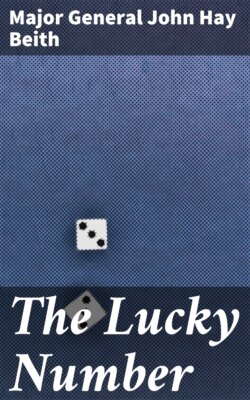Читать книгу The Lucky Number - Major General John Hay Beith - Страница 10
На сайте Литреса книга снята с продажи.
VII
ОглавлениеTable of Contents
The coroner’s jury were inclined at the time to blame the signalman, but the Board of Trade Inquiry established the fact that the accident was due to the driver’s neglect to keep a proper look-out. However, as the driver was dead, and his fireman with him, the Law very leniently took no further action in the matter.
About three o’clock in the morning, as the train was crossing a bleak Yorkshire moor seven miles from Tetley Junction, the Curate suddenly left the seat upon which he lay stretched, dreaming of Eileen, and flew across the compartment on to the recumbent form of a stout commercial traveller. Then he rebounded on to the floor, and woke up—unhurt.
“ ’Tis a accident, lad!” gasped the commercial traveller, as he got his wind back.
“So it seems,” said the Curate. “Hold tight! She’s rocking!”
The commercial traveller, who was mechanically groping under the seat for his boots—commercial travellers always remove their boots in third-class railway compartments upon night journeys—followed the Curate’s advice, and braced himself with feet against the opposite seat.
After the first shock the train had gathered way again—the light engine into which it had charged had been thrown clean off the track—but only for a moment. Suddenly the reeling engine of the express left the metals and staggered drunkenly along the ballast. A moment later it turned right over, taking the guard’s van and the first four coaches with it, and the whole train came to a standstill.
It was a corridor train; and unfortunately for Gerald Gilmore and the commercial traveller, their coach fell over corridor side downwards. There was no door upon the other side of the compartment—only three windows, crossed by a stout brass bar. These windows had suddenly become skylights.
They fought their way out at last. Once he had got the window open the Curate experienced little difficulty in getting through; but the commercial traveller was corpulent and tenacious of his boots, which he held persistently in one hand while Gerald tugged at the other. Still he was hauled up at last, and the two slid down the perpendicular roof of the coach on to the permanent way.
“That’s done, anyway,” panted the bagman, and sitting down he began to put on his boots.
“There’s plenty more to do,” said the Curate grimly, pulling off his coat. “The front of the train is on fire. Come!”
He turned and ran. Almost at his first step he cannoned into a heavy body in rapid motion. It was Excalibur.
“That you, old friend?” observed the Curate. “I was on my way to see about you. Now that you are out, you may as well come and bear a hand.”
And the pair sprinted along the line towards the blazing coaches.
It was dawn—grey, weeping, and cheerless—on Tetley Moor. Another engine had come up behind to take what was left of the train back to the Junction. Seven coaches, including the lordly sleeping-saloon, stood intact; the other four, with the engine and tender, lay where they had fallen—a mass of charred wood and twisted metal. A motor-car belonging to a doctor stood in the roadway a hundred yards off, and its owner, together with a brother of the craft who had been a passenger in the train, were attending to the injured. There were fourteen of these altogether, mostly suffering from burns. These were made as comfortable as possible in the sleeping-berths, which their owners had vacated. Under a tarpaulin by the side of the permanent way lay three figures which would never feel pain again.
“Take your seats, please!” said the surviving guard in a subdued voice. He spoke at the direction of a big man in a heavy overcoat, who appeared to have taken charge of the salvage operations. The passengers clambered up into the train.
Only one delayed. He was a long, lean young man, black from head to foot with soot and oil. His left arm was badly burned, and seeing a doctor disengaged at last he came forward to have it dressed.
The big man in the heavy overcoat approached him.
“My name is Caversham,” he said. “I happen to be a director of the Company. If you will give me your name and address, I will see to it that your services to-night are suitably recognised. The way you got those two children out of the first coach was splendid, if I may be allowed to say so. We did not even know they were there.”
The young man’s teeth suddenly flashed out into a white smile against the blackness of his face.
“Neither did I, sir,” he said. “Let me introduce you to the responsible party.”
He whistled. Out of the grey dawn loomed an eerie monster, heavily singed, wagging its tail.
“Scally, old man,” said the Curate, “this gentleman wants to present you with an illuminated address. Thank him prettily!” Then to the doctor. “I’m ever so much obliged to you; it’s quite comfortable now.”
He began stiffly to pull on his coat and waistcoat. Lord Caversham, lending a hand, noted the waistcoat, and said quickly:
“Will you travel in my compartment? I should like to have a word with you, if I may?”
“I think I had better go and have a look at these poor folk in the sleeper first,” replied the Curate. “They may require my services—professionally.”
“At the Junction, then, perhaps?” suggested Lord Caversham.
But at the Junction the Curate found a special waiting to proceed north by a loop line; and being in no mind to receive compliments or waste his substance on a hotel bill, departed forthwith, taking his charred confederate, Excalibur, with him.
